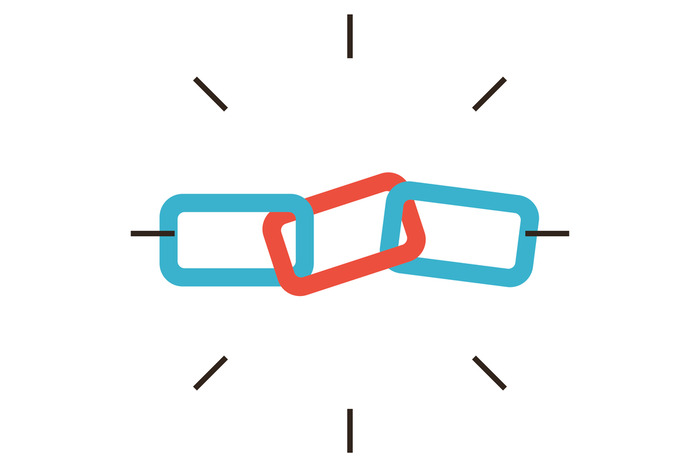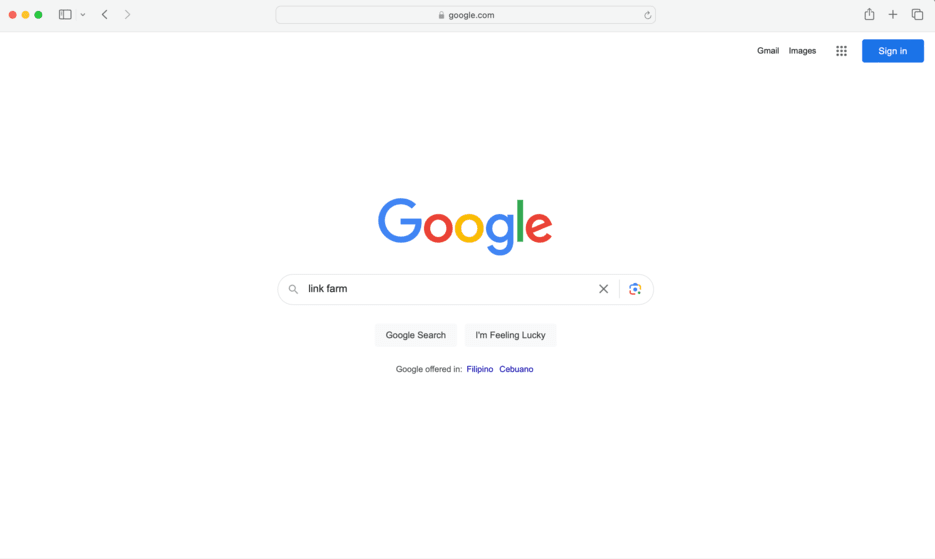It’s no secret to anyone in the search engine optimization world that link-building is a MUST.
When done organically, it can yield some great results. When done inorganically, it can lead to some pretty dire consequences that could affect your place on the search engine rankings.
This is typically called link farming, a black-hat SEO tactic used to quickly gain some links from other sites. It’s something Google and other search engines HATE and will not tolerate.
Why does Google hate link farming? Today, I’ll discuss the dangers of link farming, how you can avoid it, and what you can do instead.
What Is a Link Farm?

Link farms are a big NO-NO in SEO marketing. It is an inorganic way to gain inbound links and cheat your way up the SERP rankings.
Definition of a Link Farm
Similar to how a regular farm grows food and produce, link farming is the process of running a particular website or group of websites for the SOLE PURPOSE of gaining backlinks.
These link farms link to other websites to manipulate the search engine and ranking algorithms to boost themselves through links.
Additionally, factors like content quality and user experience are disregarded. Link farms are just there to build up their link popularity without providing the reader with any valuable information.
These farms are mostly filled with poorly written content hyperlinked to each other. Sometimes, the content is all fluff just to give the link an anchor text to latch on to.
The Origin & History of Link Farms
Site owners created link farms to exploit the search engine’s dependence on algorithms that look heavily at certain factors.
It was a response to the PageRank algorithm, which Google uses to determine the ranking of legitimate websites. It was found that you could alter your page rank through link volume, even if it were inorganic.
This is because the number of backlinks seeded out was directly proportional to the value of a particular website, with little way to distinguish which backlinks were organic and which weren’t.
However, over time, Google’s ranking algorithm evolved. Eventually, they could detect link farms and inorganic backlinks and prevent the search engines from being manipulated. Nowadays, it’s easy to identify link farms; anyone operating them can be penalized by Google.
How Does a Link Farm Work?

To prevent link farms from linking to your site, it helps to understand their structure and how they work exactly.
Basic Structure of a Link Farm
A link farm is a series of low-quality sites with content that all link solely to cheat the search engine into boosting their page rank.
It is a network of unrelated sites used to gain inbound links from one another with no consideration for how their content is written.
For example, Site A sends outbound links to Site B, which links to sites C and D. C will also link to D, which links to E and F, which links back to A, and so on.
As you can see, these member websites do a very messy form of link-building that doesn’t offer any organic links. Instead, all you are left with are spammy backlinks, which could get you penalized.
Not only that, but the content they point to is irrelevant and low-quality. It is clear that the site owner does not filter their link choices carefully.
The Purpose & Benefit of Link Farms
The purpose of farms is mainly for link-building and gaining backlinks, which could help boost rankings.
However, doing it in excess without considering the relevance of the websites themselves or the content on them can lead to some pretty bad SEO rankings. The only benefit that comes from farming is that it could potentially boost your ranking. However, Google is smarter than that and can easily detect link farms.
The Role of Link Farms within SEO

Link farming may be a black-hat SEO strategy, but it is a form of link-building, which every regular web page needs in SEO. Here are some positive and negative implications of it.
Positive Implications
Link farming has little to no positive implications.
Of course, good, reciprocal linking should help any site achieve good rankings, but in the case of link farming, there is little to no chance of it having any positive effect on your site.
Is link farming worth the risk? No.
Not only will you get penalized by Google, which may affect your search rankings altogether, but you could ruin your own brand’s reputation!
You may be branded as a cheater or scammer who doesn’t care about your readers when you use this tactic.
Negative Implications
It’s no secret that link farming is a black-hat SEO trick, as it poses several threats to your site.
First, building link farms SIMPLY for the sake of building links will not improve your site’s performance in any way. If anything, it decreases your chance of gaining any web traffic organically.
It also does not help the reader gain any valuable or relevant information. The content does not answer queries and is not built to satisfy user experience, putting your SEO efforts to waste.
These linked websites are disorganized and poorly created, and the inbound and outbound links gained are artificial, meaning it is not organically earned.
Remember that Google and other search engines only reward backlinking if done NATURALLY and with relevant content. It will only hurt your websites if you try to force your way to the top of the search results through farmed links.
Link Farms and Google

Link farming is a massive ENEMY of Google and other popular search engines. They will not hesitate to penalize those who build links inorganically and ruin the integrity of the search engine results page.
Google’s Stance on Link Farms
As mentioned earlier, Google HATES link farming.
Any links produced through farming are a means to manipulate PageRank’s algorithm. Link farming violates the Webmaster Guidelines; specifically, it is a form of spamming or spamdexing.
Fortunately, Google’s new Penguin algorithm can help sniff out link farming and unnatural inbound links.
With this new update, the search engine indexes the involved websites and analyzes where their incoming links are coming from while flagging those who engage and exchange links inorganically.
Penalties for Link Farm Use
What exactly do farmers receive as punishment?
Anyone caught farming or benefitting from it can get penalized and have their websites completely deindexed altogether.
Google has the authority to remove the involved websites from the search engine, meaning all the efforts you’ve put into buying and selling links are wasted.
You may also appear practically invisible on the search engine and receive no traffic to your websites. Ouch!
Reviewers also take manual actions at Google, where they can penalize your ENTIRE website if they spot any sign of violating the Webmaster Guidelines.
Not only that, but your branding can also be tarnished. Earning organic links can help boost your authority and the search engine and make you seem more reliable and trustworthy as a resource to your readers.
However, people who build link farms and engage in shady link exchange programs can ruin their image and make them look like a manipulative resource that only cares about search engine rankings.
Identifying a Link Farm
Now that you know why search engines like Google hate link farming, how can you avoid utilizing them? Watch out for any of these signs.
Common Characteristics of Link Farms
A link farm has several telltale signs. Keep these in mind as you practice healthy link-building for your own websites.
1. Excessive Links
Having too many links going to and from other websites is never a good idea.
Link farms are notorious for hosting outbound and inbound links in excessive amounts. Doing this both overwhelms the reader and is a clear sign to the search engines of spamming.
2. Poorly-Written Content
Low-quality content is another red flag to watch out for. If a particular site doesn’t answer your queries, is poorly formatted, or doesn’t provide valuable information, chances are it is a link farm.
Such sites rarely produce original content, meaning the content is likely recycled, paraphrased word-for-word, or, in worst cases, copy-pasted.
Because of this, farms mainly publish guest posts with the intention of placing a link on them.
3. Common Backlinks
A CLEAR sign of a link farm is linking to the same sites.
Link farms only link out to each other, creating a giant web of intertwined backlinks. Because of this, search engines believe the site’s high popularity despite only linking to the same company.
4. Spammy Domain Names
A site’s domain name says a lot about its branding and the kind of content it creates. If you see a domain name that has little to no relevance or relation to the content, chances are it is a link farm.
Just from the site or domain name, you can tell that the site has no credibility. Steer clear of sites like these, as linking to them may be detrimental to your SEO metrics.
PRO TIP: Be vigilant of companies that offer to sell links at high amounts! These companies might call themselves a private blog network (PBN), but chances are they are running a link farm. You can avoid falling for these “private blog networks” by carefully analyzing their content, metrics, domain authority, links, and more.
Tools & Methods for Identifying Link Farms
Fortunately, many of these signs are easily detectable, thanks to the different ways you can identify a link farm.
- Analysis tools – Tools like AHRefs, Majestic, and Zutrix are super helpful in identifying a site’s backlink profile.
- Verify the content – Only high-quality sites can produce relevant and well-written content. Otherwise, you may have a link farm on your hands.
Analyze the site as a whole – If it looks messy, has no real structure, has poor content, and doesn’t provide anything helpful, it may be a link farm.
How to Avoid Link Farms
Now that you know what a link farm is, it’s time to start AVOIDING them at all costs. Here’s how you can prevent yourself from getting involved with them.
Choosing White Hat SEO Tactics Over Link Farms
White hat SEO tricks will help keep your site on Google’s good side and protect you from penalties and sketchy link-builders.
One white tip is to connect with LEGITIMATE websites. Use any site analysis tool to determine the credibility of a certain site before requesting to build with it.
It’s always better to receive inbound links from relevant websites that are high-quality and help readers with their queries.
Strategies & Tips for Avoiding Link Farms
It’s easy to avoid link farms when you know what to look out for. Follow these tips to avoid link farms and keep your site safe!
1. Analyze the ENTIRE Site Before Reaching Out
Before you reach out to a site owner to exchange links, it is best to figure out what kind of site you are dealing with.
Review the site’s content and anchor texts, look at its overall design, and analyze its backlink profile. If the site looks legitimate, you can start your outreach campaign.
Otherwise, you might have gotten yourself involved with a link farm!
2. Find Information About the Author
Anonymous authors are a HUGE red flag.
The articles found on farms are usually credited under an anonymous author or a group name. Additionally, there is very little information about them on the “About” page or no information at all.
If you can’t find any verifiable information about the author/s on a site, chances are there is no one behind it, and it is most likely a link farm.
3. Check the Number of Linked Sites
Link farms usually point to hundreds or thousands of blog networks.
If you see sites linking out to a large number of sites, especially if a sizeable number of them are irrelevant, it is a clear sign of link farming.
PRO TIP: Don’t let SEO metrics trick you! Sometimes, a site will show a good domain authority and PageRank. However, it only shows that their strategy worked since they were able to artificially gain a good profile through farming links.
Frequently Asked Questions
Here are some additional questions you may have about link farming.
Is It Illegal to Use Link Farms?
No. Link farming won’t land you in prison but will harm your chances of boosting your search engine rankings.
Why Are Link Farms Considered a Black Hat SEO Technique?
Link farms are a black-hat SEO technique because they try to manipulate the search results by inorganically linking to other sites, which is against Google’s guidelines.
How Can I Recover if My Website Is Penalized for Using a Link Farm?
One way to recover from a penalty is through link detoxification. This process cleans up any unnatural links involved with your site.
You can also create a disavow file containing all the links that need deactivation and submit this file to Google’s Disavow Link Tool.
Can Link Farms Be Useful for SEO in Any Way?
Link farms can trick the SERP into believing your site is credible due to the number of links, so some unsuspecting victims may believe the site is trustworthy just because it appears at the top of the SERP.
What Distinguishes a Link Network From a Link Farm?
A link network is a group of sites that are all connected with each other and distinguish themselves with a badge or a group name.
They aren’t too different and can be interchanged with farms as they are still made with the intention of gaining links quickly.
Conclusion
Is link farming worth it if it means I could shoot up the SERP? No.
You might be able to fool the search engine, but you will eventually get penalized and deindexed if you stick to operating link farms.
Even though these sites can be tricky to distinguish, they are still avoidable if you know the common signs and strategies.
There are better and safer ways to build links with other reputable sites. It’s just a matter of careful analysis and vetting of these sites to determine whether they are worth connecting with or not.



